Marketing operations is a broad term but it plays a specific and crucial role in today’s successful marketing teams. As companies wrangle with growing quantities of data, an increasing number of channels and an expanding range of technologies, marketing operations brings everything together into a manageable strategy.
Marketing ops is responsible for defining and managing processes that ensure your primary objectives are achieved while departments, teams and individuals focus on hitting their respective goals.
In this article, we explain what marketing operations is and why it’s essential in today’s data-driven, multichannel and technology-led marketing environment.
What are we looking at in this article?
The aim of this article is to provide a comprehensive explanation of marketing operations and how to implement your own marketing ops process to meet the needs of your team.
To cover everything, this article is broken up into the following four sections:
- What is marketing ops?
- Why is marketing ops important?
- Five key roles of marketing operations
- How to implement a marketing op strategy
So let’s get started by explaining what marketing operations is and, as you’ll see from the next section of this article, the answer is a little different for every business.
What is marketing ops?
Marketing operations (MO), or marketing ops, is the management of marketing, data and technology as an integrated process.
For a modern business, these three disciplines overlap so heavily that it’s sometimes difficult to draw lines between them. More to the point, modern marketing can’t function without the other two, which means businesses need a higher tier of management to integrate these three disciplines into a cohesive strategy.
Marketing operations provides this tier of management to ensure marketers have the data and technology they need. In addition to that, marketing ops is in charge of establishing, managing and optimising processes that empower teams to maximise performance and achieve their goals.
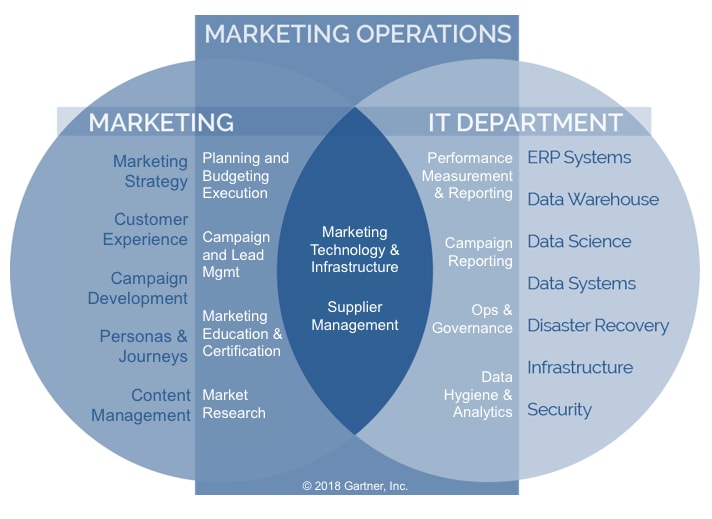
The best marketers in the game aren’t necessarily the best IT experts or data scientists – and nobody should expect them to be. There are plenty of IT experts and data scientists for that. However, each of them plays a key role in achieving the marketing objectives of the business they work for.
Marketing operations builds processes to pull these departments together with the businesses marketing goals in mind. This allows marketers to be marketers, analysts to be analysts, etc. while all working towards the same objectives.
For example, marketing ops will ensure your company is using the best CRM to integrate your sales and marketing efforts while meeting the needs of both departments. They will measure the success of teams using said CRM, confirm the platform improves marketing performance and address any issues experienced.
It will also ensure your company remains GDPR-compliant while using your CRM to manage customer data – or, at least, it should. This is a good example where compliance is essential for marketing but the data infrastructure won’t be built by marketers themselves.
That’s just one example of the kind of role a marketing ops team plays but we’ll take a more comprehensive look at its key roles later.
Marketing ops can be tricky to define
While I’m confident in my definition of marketing ops as there unified management of marketing, data and technology, it is a difficult thing to define. This is party due to how broad marketing ops can be and the fact that it means something slightly different to every business.
In situations like this, I always like to reference some definitions from trusted names in the marketing industry to provide some other perspectives and allow you to make up your own mind.
First up, we’ve got this explanation from CoSchedule:
“Marketing operations is the piece of the puzzle that defines how a marketing team runs behind the scenes. It makes sure campaigns run smoothly, team members are happy, and more importantly – meet their goals.”
CoSchedule, Marketing Operations: The Start to Finish Guide for Busy Managers
In the article above, Elise Dopson lists the following three key aspects of marketing operations:
- Data
- Technology
- People
This makes a lot of sense, too, because it is the people within marketing, data and technology departments that marketing ops manages. Although, I would argue it’s also the responsibility of MO to make sure the correct processes are in place and functioning properly – for example, reporting is delivered in the most efficient way for marketers and analysts to extract reliable insights as fast as possible.
This is echoed in HubSpot’s explanation of marketing operations although the company also acknowledges the challenges of defining it:
“Marketing operations doesn’t have the most clear-cut definition because it describes a variety of functions. Generally, marketing operations defines the team in charge of the technology and processes needed to help marketing teams run effectively.”
HubSpot, Everything You Need to Know About Marketing Operations in One Place
The same article goes on to explain that at HubSpot, “the marketing ops team is responsible for supporting the systems and processes that enable the marketing team to perform optimally in their roles.”
The Venn diagram above was originally published by Gartner and used in an article by Marc Brown, entitled Why Is Marketing Ops So Vital For Sales and the C-suite?. We’ll be asking the same question in the next section of this article but, first, let’s see how Marc explains the role of marketing operations.
“The vision for a marketing operations function is to improve the efficiency and effectiveness of marketing across people, processes, technologies, and data to achieve desired business outcomes.”
He goes on to explain: “Marketing Operations should serve as a core function for marketing, providing cross-functional coordination, communications, and reporting. Your marketing ops team will be instrumental in successfully transforming marketing into a revenue and growth engine for your company.”
Why is marketing ops important?
The simple answer is that marketing can’t operate as an independent entity in today’s data-driven world. Rewind back to a decade or so ago and big data was reserved for tech giants and enterprise brands with advanced IT infrastructures and large in-house teams of data scientists and developers.
However, the latest advances in technologies like artificial intelligence, machine learning, cloud computing and automation have opened up big data to businesses of all sizes.
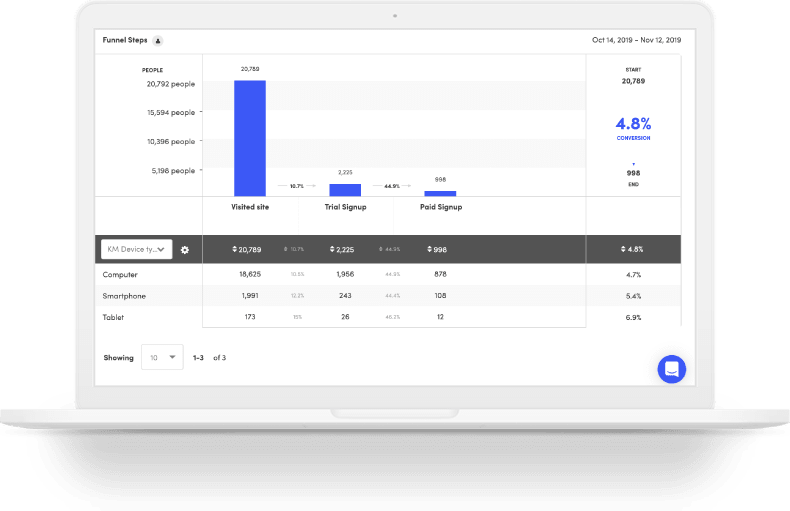
We have plenty of affordable tools for collecting and handling big data, such as Kissmetrics, SAS and Qualtrics. Likewise, smaller businesses that can’t generate enough of their own data to hit big status can tap into open data from third-party sources to gain valuable insights to drive growth while their own datasets expand.
As a result, prices and data access are no longer barriers to entry for smaller businesses.
However, businesses (and marketing teams) still need the right expertise, tools and processes to capture the right data, extract meaningful insights and then use them to inform smarter marketing and business decisions.
This is one of the key roles marketing operations plays and, just as big data is now accessible to businesses of all sizes, marketing ops is equally important to smaller businesses as their larger counterparts.
Managing the complexities of modern marketing
Big data isn’t the only reason you need a robust MO system in place. Marketing becomes more complex with every year that passes and its overlapping with other departments and technologies creates grey areas where a lack of expertise, integration, or processes can cause serious problems.
For example, your developers (whether in-house or outsourced) might be geniuses when it comes to building immersive experiences but do they have the data insights or instructions to know where strategically adding friction benefits your marketing objectives? Let’s say, adding an extra step to unsubscribing from your email lists or closing customer accounts.

In this scenario, marketing ops unites the goals of UX designer and marketer with the core objectives of the businesses and, crucially, your MO team has the authority to ensure decisions are made with these interests in mind.
Here’s a look at some of the other areas where marketing operations creates processes for the complexities of modern marketing:
- Big data: Ensuring the right data is collected, valuable insights are extracted and improved marketing/business decisions are made.
- Technology: As marketing becomes more complex, businesses rely more heavily on technology – both in terms of complexity and the number of tools required – which requires processes for choosing the best software, implementing it and maximising its performance.
- Multiple channels: The number of channels modern businesses need to be active on is always growing and the technical requirements are increasing (e.g.: programmatic chatbots, voice search, augmented reality, etc.), requiring a deeper integration of marketing efforts and software/platform development.
- The customer journey is growing more complex, too, forcing businesses to reach prospects with hyper-relevant messages across tens or hundreds of micro-interactions – all of which requires the right mix of marketing messages and technical delivery.
- Teams / departments: Businesses need a broader pool of talent on board than ever to manage a successful marketing strategy (marketers, content writers, designers, developers, analysts, etc.), increasing the managerial challenges of keeping everyone working towards the same goals (and individual ones where necessary).
- Agility: The more complex marketing becomes, the less agile your teams are and the longer it takes to strategies, approve and deploy new marketing campaigns.
- Conflicts: With more teams or departments comes the increased risk of conflict (e.g.: marketing goals vs sales goals) and you need a senior team with the authority to decide where priorities lie.
Marketing operations is in charge of overcoming these challenges by managing the cross-over of disciplines. This ensures your marketers have the reports and software tools they need to achieve their campaigns goals. It also aligns the goals of different departments when their usual priorities might not always be the same.
Perhaps most importantly, marketing ops tracks the performance of your marketing processes and strategies to identify areas for improvement. For example, it might spot inefficiencies in your process for getting campaign ideas out of the creative stage and approved for deployment.
By removing these delays, your marketing team can react to new trends faster and send campaigns live while opportunities are still hot.
5 key roles of marketing operations
Throughout this article, we’ve talked about marketing operations as the management of marketing, data and technology. However, this is a broad definition and it explains the specific roles marketing ops plays within a modern business.
So, in this section, we look at five key roles MO plays and how it empowers your brand to do more with data and technology.
#1: Marketing objectives
The most important role of marketing ops is to make sure your business is achieving its marketing objectives. During simpler times, many marketing departments may have overseen this themselves – especially at small-to-medium size enterprises.
However, this doesn’t work in today’s data-driven age where marketing objectives aren’t only achieved or missed by the marketers themselves.
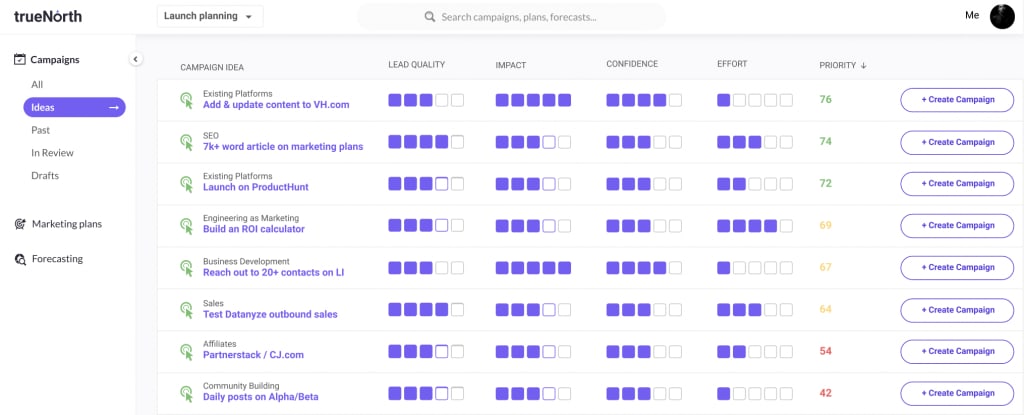
Now, you need experts with enough knowledge in data science, computational technology, business software, IT and marketing to keep all of these elements working towards your goals. You need experts who can measure the performance of these elements – both collectively and individually – and understand where things aren’t working as well as they could.
Above all, you need the expertise to see where marketing objectives are in danger of being missed and the ability to find out why – and this is the most important role of marketing ops.
#2: Process management
Arguably, the most important word in marketing ops is “process” and this is where the bulk of work lies within MO. In a calculated, goal-driven marketing strategy, you need clearly defined processes in place for everything – from campaign management and A/B testing to product design and debugging.
The exact processes your marketing ops department is in charge of will depend on the nature of your business but here are some key processes every brand needs.
Budget management
The average company spends 26% of their annual revenue on marketing and this is spread out across an ever-growing list of channels and strategies, including:
- Content marketing
- Organic search
- Paid advertising
- Email marketing
- Social media
- Account-based marketing (ABM)
Marketing operations needs to ensure that budgets are set correctly and distributed where it’s going to achieve business goals most effectively. This can change over the course of the year, multiple years and decades, meaning agile budgets need to adapt to changes, challenges and new opportunities.
Campaign management
Marketing ops is also responsible for campaign management at the highest level. This doesn’t mean your MO team is involved in the day-to-day management of campaigns (you’ve got marketers for this) but, rather, the management of campaign processes to maximise efficiency and performance.
This is especially important where marketing campaigns incorporate other disciplines, such as conversion rate optimisation (CRO), where UX design, software optimisation, testing and data management are brought into the mix.
Lead management
As the consumer journey becomes more complex (multiple channels, devices, sessions, interactions, etc.), the more you have to nurture leads across this process to turn them into paying customers.
Due to the multichannel nature of this journey, you need processes in place to incorporate different marketing strategies and the other disciplines involved in covering the entire customer journey – sales, customers service, software development and more.

Marketing ops is responsible for putting these processes in place so that websites are designed and optimised to achieve your marketing objectives, sales and marketing are integrated where necessary and new channels are built to cover gaps in your marketing funnel (e.g.: multi-step forms, live chat widgets).
Asset management
Modern marketing teams deal with an overwhelming number of assets, including logos, templates, images, automation workflows, custom-built tools and data (that last one is particularly important).
Once again, you need processes for storing, managing and protecting your assets so that nothing is lost, overwritten or deleted. Likewise, you need processes in place to ensure non-owned assets, such as images taken or created by people outside of your organisation, are used properly.
In the age of GDPR and intensifying data regulations, it’s fair to say that customer data is your most important asset and you certainly want to make sure you have robust processes (and back-up processes) for this.
Technology implementation
The demands of data-driven marketing are intense and having the right technology on your side is just as important as having the right personnel. Every process marketing ops is responsible for involves a range of technologies and software tools to operate effectively – everything from design tools and your CRM to A/B testing software and analytics tools.
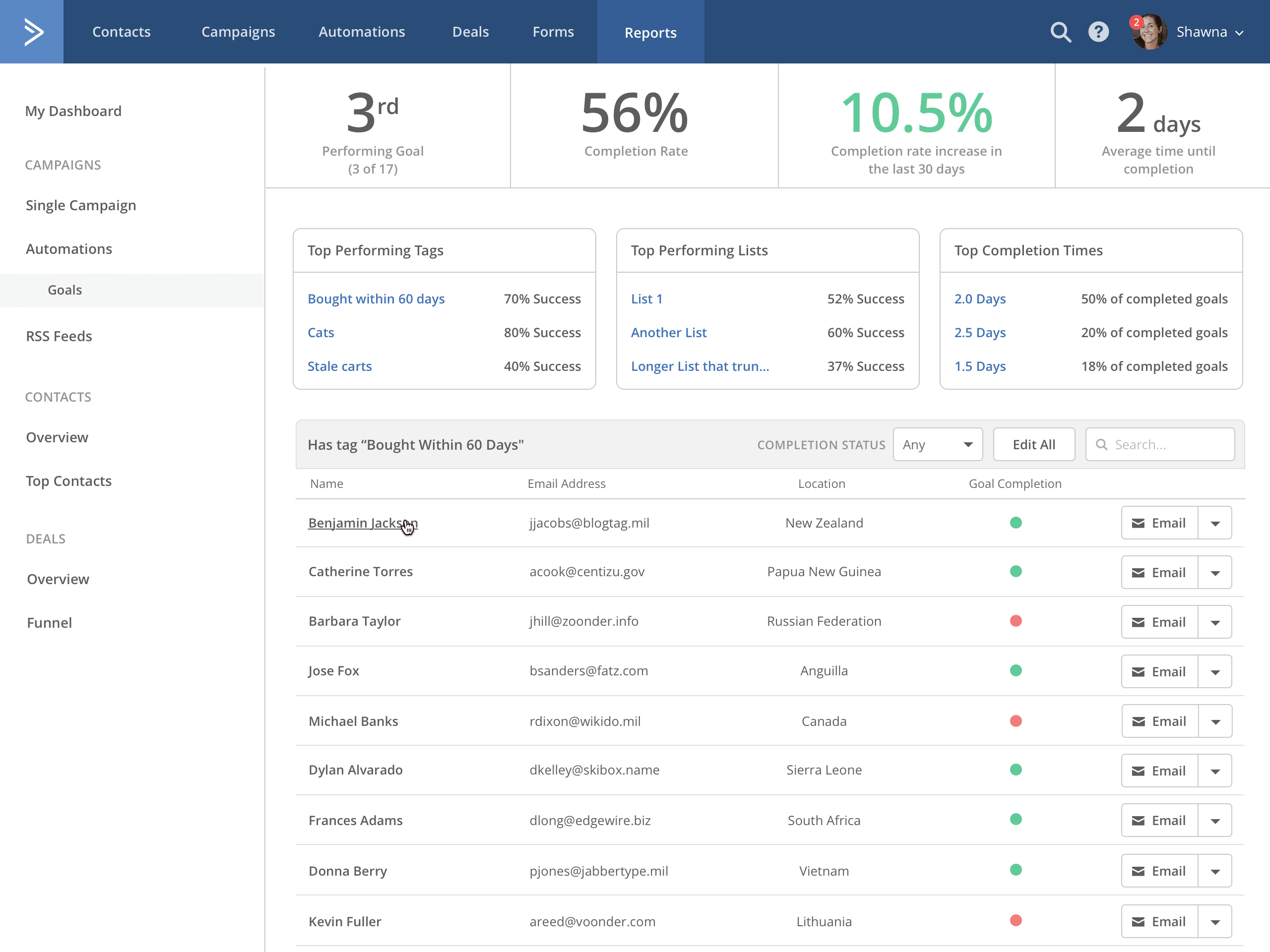
Marketing ops needs to make sure you have the right tools to achieve your marketing objectives, create the required assets, manage campaigns and measure performance. It also needs to make sure these tools are integrated and working properly and identify any technology issues that are holding back progress.
#3: Alignment & unification
When marketing teams can’t achieve their objectives without the help of other disciplines (design, sales, development, etc.), you need processes in place for collaboration and marketing ops is there to help them work together as effectively as possible.
This starts with aligning their goals so that everyone’s pulling together in the same direction.
One of the most common examples of this for modern businesses is integrating sales and marketing. This can be challenging because it’s difficult to define where marketing ends and sales begins while there’s also a history of conflict between the two disciplines.
In fact, Philip Kotler, Neil Rackham and Suj Krishnaswamy describe this conflict as a full-blown “war” in their article for Harvard Business Review, Ending the War Between Sales and Marketing.
“When sales are disappointing, Marketing blames the sales force for its poor execution of an otherwise brilliant rollout plan. The sales team, in turn, claims that Marketing sets prices too high and uses too much of the budget, which instead should go toward hiring more salespeople or paying the sales reps higher commissions.”
Your marketing and sales ops managers are responsible for unifying these teams where necessary and aligning their goals where overlaps occur. By having authoritative leaders who understand the need for alignment and compromise, any in-fighting between teams becomes irrelevant.
Marketing ops is senior to the sales team (as is sales ops to the marketing team) and has the authority to ensure marketing objectives are prioritised where necessary. Of course, this relies on having the right marketing and sales ops personnel (and senior figures above them) who can work out the best overall approach for the business.
#4: Reporting & analytics
Data should inform every marketing decision your business makes but you’re only going to make good data-driven decisions if you have the right data processes in place.
This starts with collecting the right data and, then, compiling and cleaning it to remove anything that might compromise your insights.
In the age of big data, we’re generally talking about datasets that are too large for humans to analyse and this is where you need machine learning tools to process large amounts of data and spot trends reliably.
Data visualisation is another crucial component, especially when you’re dealing with large datasets or complex reports.
Once again, it’s up to your marketing ops team to create the necessary data processes to achieve valuable insights, manage those processes and ensure your marketing team has all the data tools (and reports) they need to hit targets.
#5: Process optimisation
Creating and managing marketing processes is one thing but MO also needs to optimise these processes to spot weaknesses and improve performance. Earlier, we touched on a common problem businesses face in today’s marketing environment where it takes longer to get campaign ideas off of the drawing board and approved for deployment.
This is a perfect example of where marketing ops needs to analyse this process, find the weaknesses and provide solutions that create a more effective system of approval.
Another good example would be your process for tracking and reporting on budget performance and ROI. Marketing ops should analyse this process to look for weaknesses, delays or errors in the reporting that limit your ability to set and redistribute budgets to achieve the highest performance.
By optimising and improving this process, you can react to changes, reallocate budgets and adapt faster to new opportunities.
How to implement a marketing ops strategy
By this point, you should have a good idea of how to implement a marketing ops strategy that meets the needs of your business. There are six key steps to building and implementing a strategy successfully although you may add further steps between these if you have specialist requirements – e.g.: developing your own in-house software.
The six steps are:
- Set clear goals for your marketing ops strategy
- Get the necessary expertise on board
- Define your marketing ops processes
- Build your marketing ops tech stack
- Assign roles across all marketing activities
- Measure performance & optimise your processes
As with all strategic measures, your first task is to set specific goals for your marketing ops strategy to guide your implementation and management from start to finish.
Step # 1: Set clear goals for your marketing ops strategy
As we’ve explained at multiple points throughout this article, marketing operations means something slightly (or very) different for every business. As a result, the potential goals of any given MO strategy can vary significantly , making it all the more important that you define clear, specific goals.
Here are some examples:
- Align marketing & sales
- Reduce campaign deployment time
- Improve budget allocation
- Increase the quality of data insights
- Respond to market shifts faster
- Integrate multichannel strategies
- Increase customer retention rates
Those are just some ideas to get you started and your marketing ops goals should be even more specific than the suggestions in that list – e.g.: increase customer retention rate by 7.5% by the end of 2021 with targets set for the end of each quarter until then.
What you don’t want to be doing is setting goals like “increase revenue” without specifying processes, channels or targets to focus on.
Step # 2: Get the necessary expertise on board
Once you know what your marketing ops objectives are, you should understand what kind of talent you need to bring on board. First of all, you need to make sure you’ve got the right personnel and skillsets on each team and, then, you can start thinking about marketing ops and managers.
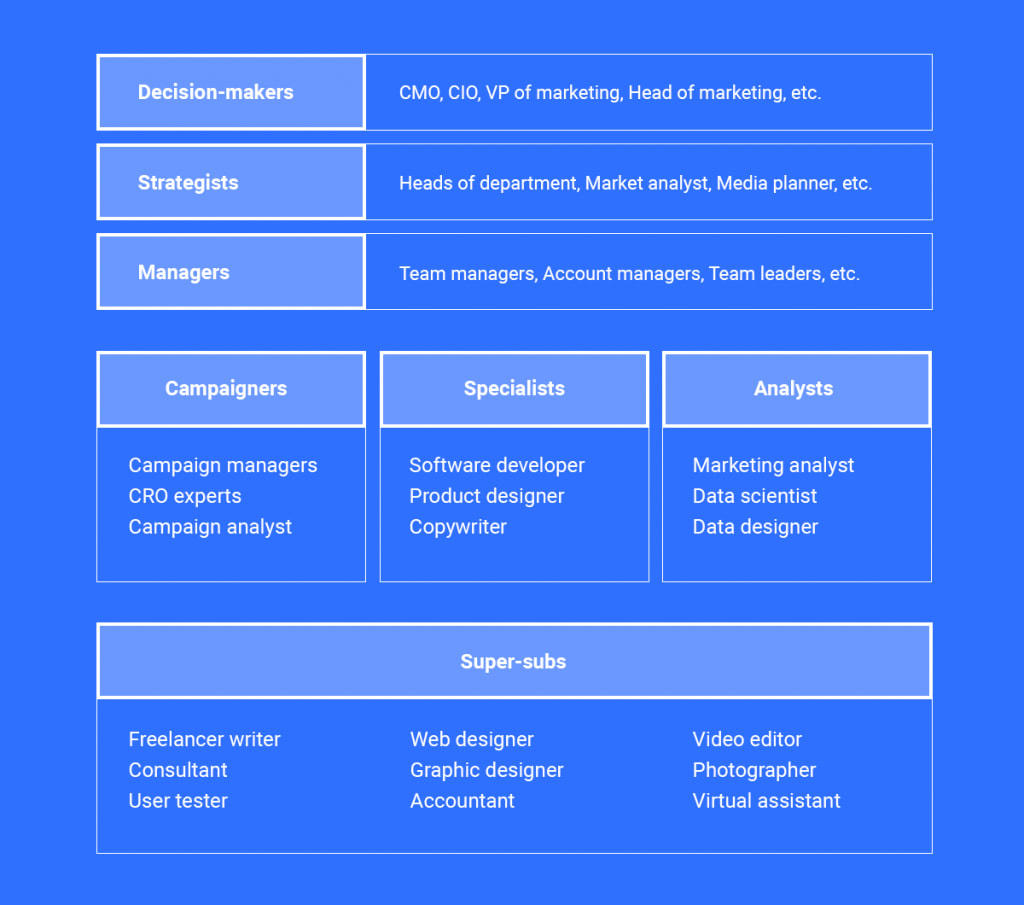
Keep in mind that marketing ops is all about establishing and optimising processes that unify data, technology and marketing so you’re going to need a rounded level of expertise in all three areas on your marketing ops team/manager.
This doesn’t mean they need to be marketing experts, data scientists and IT technology masters but they do need enough rounded expertise to work with all three departments and help them achieve the best results.
Think GP rather than a healthcare specialist.
Step # 3: Define your marketing ops processes
Now, we get down to the crux of your marketing ops strategy where you define processes for every marketing activity. This is where the bulk of your marketing ops workload lies, providing frameworks for manual processes your team members have to complete.
A comprehensive process should include documentation for the five Ws:
- What teams and individuals need to do to complete a task.
- Who specifically should handle each task involved.
- How the task in question should be completed.
- When the task should be completed or how long it should take.
- Why, as in the target, purpose or goals of each action (where relevant).
This may sound elementary but it’s crucial for building robust marketing processes that assign every task to the relevant person with clear steps and objectives.
The more detailed your processes are, the more control you retain over marketing activities and the more effectively your marketing ops strategy can manage and optimise these processes to improve performance.
Step # 4: Build your marketing ops tech stack
Technology is central to marketing operations and there are two key tasks you need to address at this point:
- Ensuring your marketing ops team/personnel have the tools they need
- Ensuring every member of your marketing team has the tools they need
Like many things, the best tools for your business is highly subjective but you need to go back to your marketing ops goals and choose technology based on the effectiveness of achieving your objectives.
Cost is always a factor, too, of course, but don’t overlook the importance of integration. You don’t want to waste time manually repeating tasks or transferring data between apps when these actions can be automated with integrations.
We’ve got plenty of articles on our blog looking at the best marketing tools across a broad range of categories, if you need help with this.
- 10 Best Email Marketing Software & Email Automation Tools
- The 7 Best Marketing Automation Tools & Platforms
- 30+ Best Free Marketing Tools
- 53 Business Automation Tools That Skyrocketed Our Growth by 330%
Also, be sure to check out Marketing Automation Insider for free, personalised recommendations, based on your business’ needs.
Step # 5: Assign roles across all marketing activities
One of the key functions marketing ops plays is ensuring tasks are clearly assigned to the relevant person or team. Everyone should have an explicit understanding of their role, responsibilities and authority to make decisions – as well as where their responsibilities end.
This is particularly important where marketing teams overlap (e.g.: SEO and content marketing) or marketing efforts overlap with other departments, such as sales and customer service.
Step # 6: Measure performance & optimise your processes
Once your marketing operations strategy is running, there’s a settling in period where you might need to work out any kinks. During this period, you should already be measuring performance and collecting data across every process so that you can build up a reliable database to optimise and improve each process over time.
This brings us back to the goals you set out in step #1 and the first task is to measure the success/failure of your initial processes in achieving these objectives.
Over time, marketing ops should constantly scrutinise each process, test data-driven improvements and optimise them to achieve your objectives more effectively.
For example, if your goal is to respond to market shifts faster, your processes for collecting and compiling data, processing data and extracting insights, strategising responses and deploying campaigns should all be optimised to reduce times without compromising quality.
Achieve goals faster & set more ambitious targets
Marketing ops is all about empowering your marketing team to achieve your goals more effectively. Faster goals completion allows you to set more ambitious targets and increase growth rates by taking full advantage of big data and technology that’s advancing more every year.
As marketing becomes more complex and integrated with other business disciplines, marketing operations put processes in place for every team and individual to maximise performance and helps them integrate with others under shared goals.




